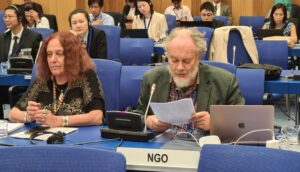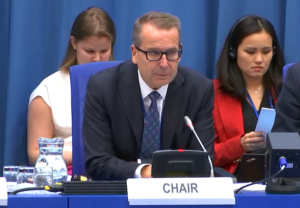NoFirstUse Global releases follow-up briefing paper:
Nuclear weapons non-use BREAKTHROUGH! From taboo since 1945, to normative law as of 2022.
2022 has witnessed many setbacks in the field of nuclear disarmament, but there is one important exception. The status of nuclear weapon use has received a major upgrade from taboo to normative law through two significant developments:
On January 6th, the five NPT nuclear-weapon states (China, France, Russia, the United Kingdom and the United States) declared at the head of state or government level that “A nuclear war cannot be won and must never be fought.”
Then on November 17th leaders of the G20 – which includes six nuclear armed states, seven states in alliances with nuclear-weapon states and six nonaligned/neutral states – declared that “The threat of use or use of nuclear weapons is inadmissible.”(See G20 Bali Leaders Statement paragraph 4. The G20 countries are Argentina, Australia, Brazil, Canada, China, France, Germany, India, Indonesia, Italy, Japan, Mexico, Russia, Saudi Arabia, South Africa, South Korea, Turkey, the U.K. and the U.S. The European Union is also a member).
The G20 statement, in particular, indicates a breakthrough in consolidating a general practice against nuclear weapons use and elevating this to a norm now accepted, at least on paper, by the nuclear weapon states.
NoFirstUse Global today releases a discussion/briefing paper entitled Nuclear weapons non-use BREAKTHROUGH! From taboo since 1945, to normative law as of 2022 (below and as a PDF) which discusses these developments and suggests ways in which this normative law prohibiting nuclear weapons can implemented in national policy and further strengthened in order to eliminate the risk of nuclear war and pave the way to the elimination of nuclear weapons.
Nuclear weapons non-use BREAKTHROUGH!
From taboo since 1945, to normative law as of 2022
A briefing paper by NoFirstUse Global[1]
December 2022
2022 has witnessed many setbacks in the field of nuclear disarmament, but there is one important exception. The status of nuclear weapon use has received a major upgrade from taboo to normative law.
On January 6th, the five NPT nuclear-weapon states[2] declared at the head of state or government level:
“A nuclear war cannot be won and must never be fought.”[3]
On November 17th at the Bali G20 Summit, those five states, plus a non-NPT nuclear-armed state[4], seven states[5] in alliances with nuclear-weapon states and six nonaligned/neutral states declared, at the head of state or government level[6]:
“The threat of use or use of nuclear weapons is inadmissible.”
If it was intended for these twenty-two words have any meaning, surely they constitute, at the very least, an obligation to extend, uninterrupted, the record of non-use since 1945, and consequently to cease any and all threats to do otherwise.
The threat or use of nuclear weapons has previously been judged as generally in violation of international laws of warfare – including international humanitarian law – by the International Court of Justice (ICJ) in 1996. And in 2018, the UN Human Rights Committee (the body of independent experts that monitors implementation of the International Covenant on Civil and Political Rights by its States parties) affirmed that “the threat or use of weapons of mass destruction, in particular nuclear weapons, which are indiscriminate in effect and are of a nature to cause destruction of human life on a catastrophic scale is incompatible with respect for the right to life and may amount to a crime under international law.” However, until now, the nuclear armed states had taken a ‘permissive’ approach to the ICJ Advisory Opinion – misinterpreting it as permitting threat or use of nuclear weapons in “extreme circumstances”[7] – and had disregarded the opinion of the UN Human Rights Committee.
By promulgating a norm against escalation to the use of nuclear arms as well as threatening such use, the 2022 G20 Summit’s concise sentence moves the world significantly closer to the finding of the ICJ and the stance of the UN Human Rights Committee.
Credit for the breakthrough at the G20 meeting most likely goes to India and China [8], with support from Indonesia and the nonaligned/neutral countries. However, strong contributing factors in this move were the increased threats of use of nuclear weapons accompanying the Russian invasion of Ukraine, a high level of political and public attention to the potential impacts of such use, and a measured response from USA and NATO centered on non-escalatory and non-nuclear responses to such threats.
This is to be celebrated, certainly, but there is no time to waste: the challenges ahead will require sustained action. They are to:
- Align policy and practice with this norm.
- Codify this norm into a binding international treaty.
- Gain universal adherence.
Align policy and practice
Four of the nuclear-weapon states have long had policies and practices that “admit” initiation of nuclear warfare (first-use of nuclear weapons), as has NATO[9]. Such options must be systematically expunged. This would include terminating all plans and preparations for the first-use of nuclear weapons and weapons systems designed for this, and making such plans and preparations illegal under domestic law, with punishment for violations.
Codify this norm into a binding international treaty
Declarations are all well and good, but, even when codified in domestic law, they lack mutual accountability. An international treaty, or a UN Security Council resolution under Chapter VII, is needed to enshrine these commitments and to require their strict implementation[10]. A meaningful agreement must include mechanisms to follow-up on suspected violations and, ideally, measures to impose penalties for noncompliance and/or to enforce compliance. The time would appear ripe for negotiations to this end.
Gain universal adherence for a binding international treaty.
The scope of the new norm may seem global, but it is not universal. The willingness of some states to take on treaty obligations may depend on who else is on board. Israel, Pakistan, and North Korea have not taken part in promulgating either declaration. Israel’s policy formulation that it will “not be the first to introduce nuclear weapons into the Middle East” would appear the be equivalent. But, in effect, it is an impediment to domestic codification and international adherence. As with NATO and Russia, North Korea and Pakistan retain the option[11] to initiate nuclear war. Unlike NATO[12] and Russia, they (and, to a lesser extent, Israel) have some reason to fear being overrun by conventional force (of US and India, respectively). Gaining their adherence might require providing security guarantees that put them on a more equal footing with their larger adversaries.
Joint action “Opening the way to establishing a NWFW”
This line of joint effort might provide an atmosphere of stability and constraint conducive for the nuclear armed states to “pursue in good faith, and bring to a conclusion, negotiations leading to nuclear disarmament in all its aspects under strict and effective international control” as required by the International Court of Justice in order to achieve a nuclear-weapon-free world.
The forms this joint effort might take have been suggested in the civil society working papers to the NPT[13] and will be the subject of a subsequent briefing paper.
[1] This paper has been prepared by Aaron Tovish, Director of Zona Libre and Alyn Ware, Director of the Basel Peace Office and is supported by the NoFirstUse Global Steering Committee, of which they are both members.
[2] China, France, Russia, the United Kingdom, and the United States, the nuclear-weapon possessing states that are parties to the Non-Proliferation Treaty, as distinguished from the nuclear-armed countries that are not parties to the NPT (India, Israel, North Korea and Pakistan).
[3] The statement was issued in the name of heads of state or government.
[4] India, which has a no-first-use (NFU) of WMD policy.
[5] Australia, Canada, Germany, Italy, Japan, Republic of Korea, Turkey, all allied with the US, the Europeans, also, with the UK (but not France, which stands apart from NATO Nuclear Planning Group).
[6] At the G20 Summit, member states were represented by their head of state except Russia which was represented by its foreign minister.
[7] Most often this is expressed as a “threat to the very survival “of the state, but in practice this means a threat to the nuclear arsenal. (The survival of the arsenal apparently outweighs the survival of humanity!)
[8] They are the only nuclear-armed states that have consistently adhered to a no-first-use policy since they first acquired nuclear weapons. China considered the January statement a partial step forward; India has sponsored a non-use resolutions in the UNGA for several decades.
[9] All this applies to NATO members, especially Germany, Italy, Netherlands, and Turkey who have nuclear weapons stationed on their territory (three of whom are associated with the November G20 declaration).
[10] Note that this would, ipso facto, deliver the negative security assurances (NSAs) that the non-nuclear weapon states (NNWSs) parties to the NPT have long sought.
[11] NATO, Russia, North Korea and Pakistan state this as a ‘right’, but no one recognizes this as a right other than themselves. (The recognition accorded the NPT NWSs does not apply to initiating nuclear warfare, but neither does it rule it out, even against NNWSs – although “negative security assurances” are the norm.)
[12] Some of the smaller, more exposed, nonnuclear members of NATO fear being overrun, this being the reason they joined NATO in the first place. NATO first use has been a given from the time of its founding, but is the Article IV commitment to come to their defense really enhanced by that? It is doubtful that the public at large would want a nuclear war started on their “behalf”. So far there has been no push back on either of the two declarations.
[13] Abolition 2000 NWC Reset: Frameworks for a Nuclear-Weapon-Free World. A civil society working paper submitted to the 10th Review Conference of States Parties to the Nuclear Non-Proliferation Treaty https://reachingcriticalwill.org/images/documents/Disarmament-fora/npt/revcon2022/ngo-materials/WPAbolition2000WG-2.pdf and No-first-use of nuclear weapons: An Exploration of Unilateral, Bilateral and Plurilateral Approaches and their Security, Risk-reduction and Disarmament Implications, a working paper submitted by NoFirstUse Global to the NPT Review Conference.




